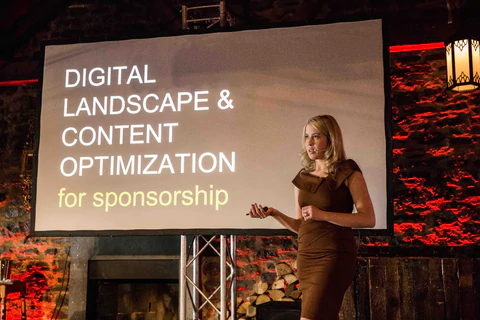Digital sponsorship activation: Q&A with Samantha Phelan

Samantha Phelan Interview
By: Joey Franco
We sat down with Samantha at the 2017 Relevent Conference to discuss content creation and the world of digital marketing.
Samantha Phelan has many passions; from sports storytelling. She has consolidated her passions into becoming a sought-after marketing professional who has worked alongside many of the world’s top sports teams. Her key interests include content creation, partnerships, and disruptive strategy.
Samantha plays predominantly in the sports world and loves the collective experiences she can bring to fans across the globe through digital.
She has a Bachelor of Commerce from Memorial University where she was Class President and Valedictorian. Her work experience spans as far as Malaysia, Indonesia, Brazil, England, and the APEC region.
Joey: First of all, what enticed you to come to the Relevent Conference?
Samantha: I mean how could you not want to come to a conference that resides here? It’s just a beautiful city and Old Montreal specifically. But I think the Relevent Conference attracted me because it stands out from other sponsorship conferences that I might have been to. There’s an intimacy to it that feels more connected, and there’s actually an application to the things that you’re learning. It’s not just you’re sitting in on sessions throughout an entire day and then you leave the conference and then you just have a couple business cards in your pocket. You’re actually brainstorming and having conversations and quality conversations with other professionals in the room on a daily basis about the content you just consumed from that presentation.
So, I think there’s so much more value in that. It is a form of networking, but you’re networking with people that you can highlight each other’s skill sets too—so it’s not just a conversation with somebody and you saying what you are doing and me saying what I do, but rather it’s a conversation about here’s what I know then here’s my approach and you get to learn other approaches from other people around content that’s all very new and exciting to you. So, I actually think that’s probably the biggest benefit to coming to a conference like Relevent.
Joey: We hear people say content is king all the time, but in many ways I feel that brands don’t really understand the importance of it. How important is quality content as opposed to just on-the-whim content that brands create just for the sake of creating it?
Samantha: Yeah in my presentation I think specifically, it was about the importance of content and thinking about the end user, and so to your point about quality, I think it is crucial. There’s so much content; the average person on Facebook every day is seeing between sixteen or seventeen hundred messages daily on Facebook. Content is crucial, and that if you are just doing what everyone else is doing or doing what’s expected of you, you’re not going to stand out amongst that many messages.
So it’s very important that you’re creating content that has the end user in mind and that provides a lot of value, and it’s going to stand out. I think the problem that a lot of people have with that is they automatically think creating content that is quality comes with a bigger price tag and comes with more time commitment, which isn’t always the case.
Typically, it’s just a little bit more innovation and ideation, but doesn’t always necessarily come with a higher price tag, which is why you see videos that were shot on an IPhone go viral and get the exposure that brands would love to have. That’s why you see influencer marketing of people who don’t have savvy video production teams or photographers behind them, but they can still get the reach and still get the application of their content out there.
So, I think it is really important, but I think that the biggest part of that quality content is tying it back to who’s consuming it, and does it really provide a lot of value back to them?
Joey: You work in the Canadian market as well as internationally, You mention Juventus, Real Madrid—is there a difference between the way they brand their content out there in Europe and around the world and the way they do it in, let’s say, Canada?
Samantha: Yeah, I think there’s different flavours for different areas of the world, and obviously context is so important and this is not a new conversation. I think globalization is just about realizing the context and how things are communicated differently in those places. So, I think it has been sometimes a challenge, but otherwise a lot of the work that I’ve done with any of those teams has been about growth. They’ve reached market saturation perhaps within their own countries, but how do they grow beyond that? It’s helping them provide context in areas which I’m more specialized in because I know the Western world a little bit more, I know the North American market a little bit more, but there’s always those intricacies that you learn along the way, which in my opinion is no different than when you’re starting to work with a new property and you have to know what the regulating bodies, guidelines are, or what the league’s guidelines are.
Joey: Is it easier to work with a huge property like a Real Madrid or a smaller property like a local hockey team, especially with the red tape and the restrictions that we have? Will you have more flexibility included in what you want to achieve in the smaller properties?
Samantha: No, I don’t think I can say that either is easier, because as you said like when you have a much bigger team that you’re working with, you have a lot more red tape and you have League regulations, but you have deeper pockets most of the time to be able to create content and really make a vision come to life. When you’re working with a smaller team, typically you don’t have the same sort of budget or resources, human capital, so it’s just sometimes the vision can be executed much more seamlessly, which was the case with the hockey team I used to work with. We had almost no red tape, but we didn’t have the deep pockets all the time. So, I think what is one’s problem is one’s advantage and vice versa.
Joey: There is a trade-off in certain ways.
Samantha: Yeah, and I think it depends on what you want to activate. I’ve found that when you work with smaller budgets, you become far more creative with your approach and tying in elements like P.R. and communications, and media becomes a lot more important. But when you’re working with bigger teams, you get to execute everything you can imagine and more—and really see things come to life which is oftentimes quite gratifying.
Joey: Where do you see the industry as a whole when we talk about content creation, content marketing, where is it all going the next five to ten years? Is it going to be changing, keep growing, evolving or growing exponentially?
Samantha: Good question. I think how we consume content is ever evolving and will probably be the most apparent change in the next five to ten years. If you think about things that we were highly dependent on five years ago, such as blogs, and now you do see a propensity more to video creation as opposed to blogs—or podcasts as opposed to blogs.
Content creation is changing based on how people are consuming. But, I think that content itself is constantly evolving when it comes to ideation and I think like that the innovative, the people who are most innovative are the ones who will win. And I actually think in content creation, change is constant. Like constantly evolving to what’s happening right now, what’s on trend, what’s on brand, and what’s new.
Something that’s been newly introduced into the market that will allow you to get your message out there and using those channels. Right now, I specialize in digital media, Facebook and Instagram, but I’m not confident that I can tell you ten years from now that that will be the main focus of where I’m working, but I’ll still be in the realm of being a storyteller and being a content creator wherever people are consuming content.
